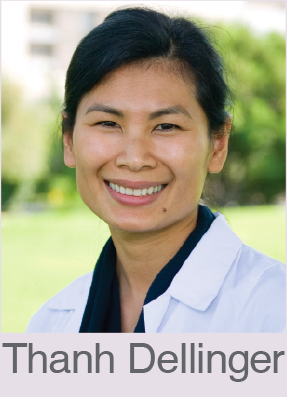

It has long been said that imitation is the sincerest form of flattery. At City of Hope, researchers are implementing this concept of imitation—of making one thing similar to another—in a leading-edge approach to treating difficult cancers.
City of Hope’s new chief of surgery and an enthusiastic researcher, Yuman Fong, M.D., has been developing a therapy that essentially makes resistant breast cancer respond like thyroid cancer, which is cured in 90 percent of patients.
Triple-negative breast cancer—named for its lack of three important receptors that can be targeted with common, effective therapies—remains a challenge for women, as well as for the oncologists who care for them. Fong is energized by this challenge and the promise of discovery. “If we can find something that can kill [these types of] cancer cells, it would be a big breakthrough for the field,” he says.
Fong has been developing a new approach to treating triple-negative breast cancer by starting with what he knows and loves: viral therapy. He has long studied how viruses can kill cancer. Happily, his expertise in viruses and affinity to the challenge of treatment-resistant cancers is a good fit.
“Many of the reasons these cancer cells are highly resistant to chemotherapy and radiation are reasons they should support the growth of viruses,” Fong explains. Cells become resistant to treatment when they turn off the normal “shut down and die” response to toxins such as chemotherapy and radiation. With this response turned off, cancer cells can support and spread a viral infection.
To further enhance viral therapies, Fong is engineering viruses with genes that induce cell death. He recently published a study that showed that viruses can be engineered to cut off the blood supply to cancer cells, and to stimulate surrounding immune cells to recognize and kill cancer. These engineered viruses are currently in clinical trials for resistant head and neck cancers and for mesothelioma, a deadly type of cancer that grows in the lining of the lungs.
Fong is now engineering viruses to produce a protein called hNIS, which carries iodine into thyroid cells. Using these engineered viruses, physicians can deliver the same treatment to breast cancer patients as they would to patients fighting thyroid cancer: radioactive iodine. When the iodine is introduced into breast cancer cells by the virus engineered with hNIS, it kills cells in a radius of 3mm around the infected cell.
Already proven effective in early studies, this viral treatment is nearly ready for human clinical trials.
Fong hopes to start these studies at City of Hope by next year—and to find that, with this new therapy, resistant breast cancer will have the same successful cure rate as thyroid cancer.
Perhaps this experience is familiar to you: During a difficult time, you receive comfort from friends and family. Still, you sometimes feel isolated and alone. Then you meet someone who has “been there,” someone who understand your struggles, can celebrate your victories and can show you that it is possible to make it through the tough times.
Women battling gynecologic cancers need this kind of support. Although partners, children and friends are important companions, a peer who has been through the same experience can offer a special kind of encouragement, because they truly know what it was like.
To make this possible, City of Hope has introduced a program that offers peer-to-peer care and companionship for women. Called Woman to Woman, the program is a signature initiative of the Ovarian Cancer Research Fund (OCRF), which recently awarded seed funding to start the program at City of Hope. Only 13 other institutions in the country have been selected as sites for the program.
By matching women battling cancer with professionally trained survivor volunteers who provide opportunities for connection, education and empowerment, Woman to Woman supports patients and their families through all phases of treatment and recovery. In addition to gaining a valuable relationship, women who participate in the program receive materials developed by OCRF that include comprehensive information about gynecologic treatment and survivorship. The program provides financial assistance when it is needed.

 Woman to Woman is also committed to its volunteers. The program provides support through monthly meetings and offers a program coordinator to answer questions, address difficulties and help survivors process their experiences. Through this process, Woman to Woman helps survivors transform a life-altering experience into a gift that can be offered to others.
Woman to Woman is also committed to its volunteers. The program provides support through monthly meetings and offers a program coordinator to answer questions, address difficulties and help survivors process their experiences. Through this process, Woman to Woman helps survivors transform a life-altering experience into a gift that can be offered to others.
Michele Ochoa, M.S.W., a clinical social worker in City of Hope’s Department of Supportive Care Medicine, leads Woman to Woman in partnership with Thanh Dellinger, M.D., a gynecologic oncologist in the Women’s Cancers Program. They have involved Volunteer Services, who will recruit and train survivors to serve as peer mentors, and Patient Resources to serve patients who are particularly vulnerable.
Woman to Woman started at City of Hope on July 1. During this first year, staff will carefully evaluate the effectiveness of the program, so that any necessary changes can be made to ensure that women with gynecologic cancers receive the kind of compassionate care that makes City of Hope such a special place. CN

 Login
Login
